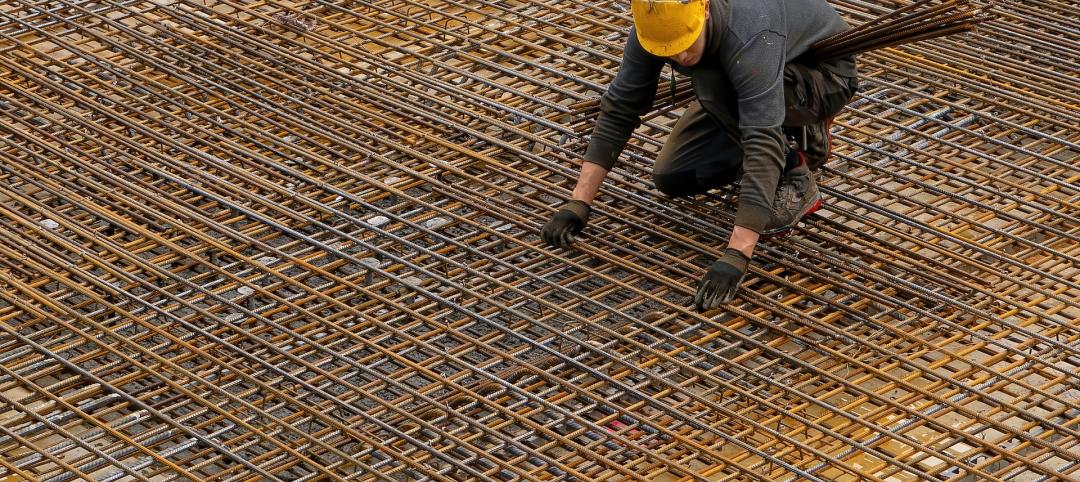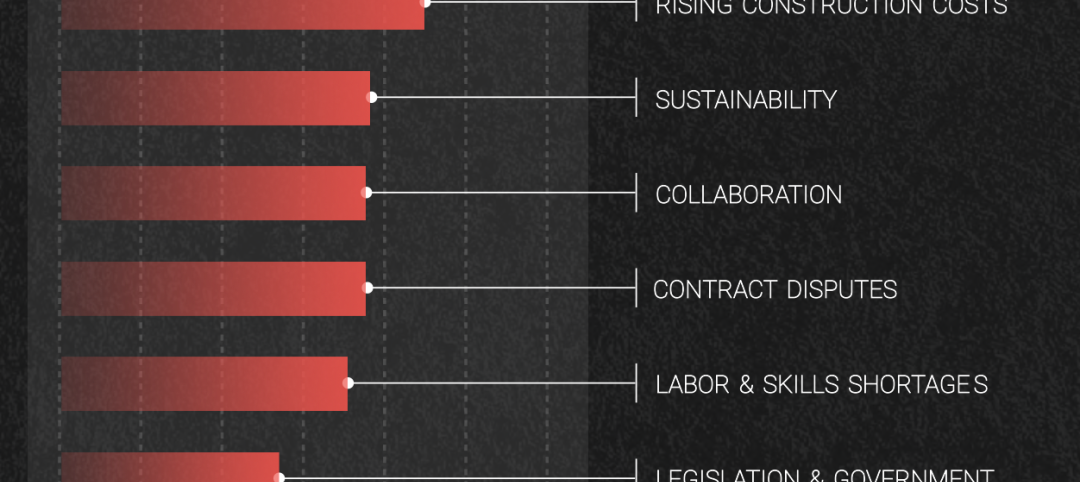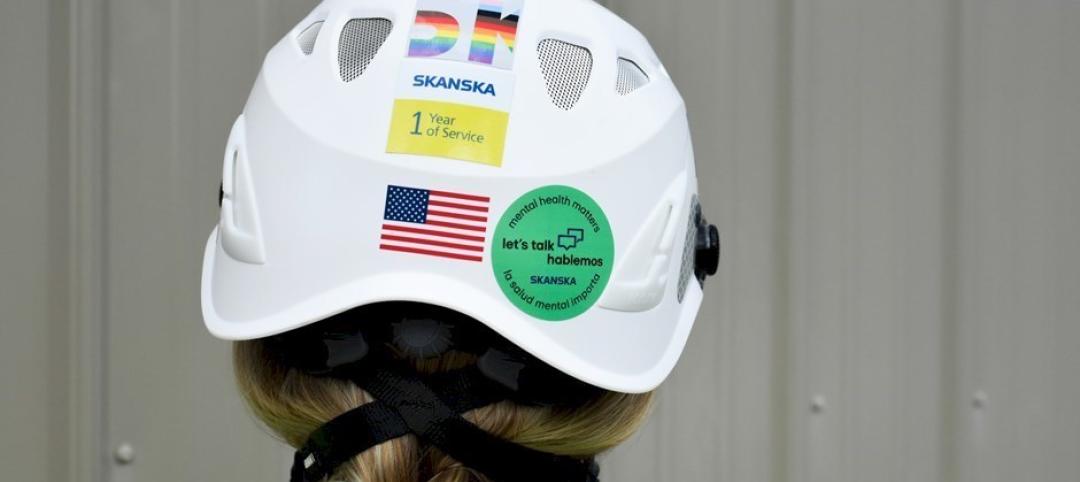Through September, spending on nonresidential construction was up 9.2%, to $883.9 billion, according to preliminary estimates by the Commerce Department’s Bureau of the Census. Sectors hard-hit by the coronavirus pandemic—including lodging, retail/commercial, and even office—were showing signs of life.
So it makes sense that a recent polling of 212 architects, engineers, contractors, and developer/owners found nearly three-fifths of respondents—59.4%—rating 2022 an “excellent” or “good” business year. Only 15.6% rated the year “mediocre” or “poor.”
The vast majority of firms, 77.7%, rated their overall health “very good” or “good.” Conversely, only 4.7% saw their firms’ financial condition as either “weak” or “very weak.” Among the firms polled, 55% confirmed their revenue had increased, and another 20.9% said their revenue was level with last year’s. Gains were achieved despite nearly three-quarters of the firms surveyed characterizing the construction/materials market hobbled by supply-chain snags as “intensely” or “very” competitive.
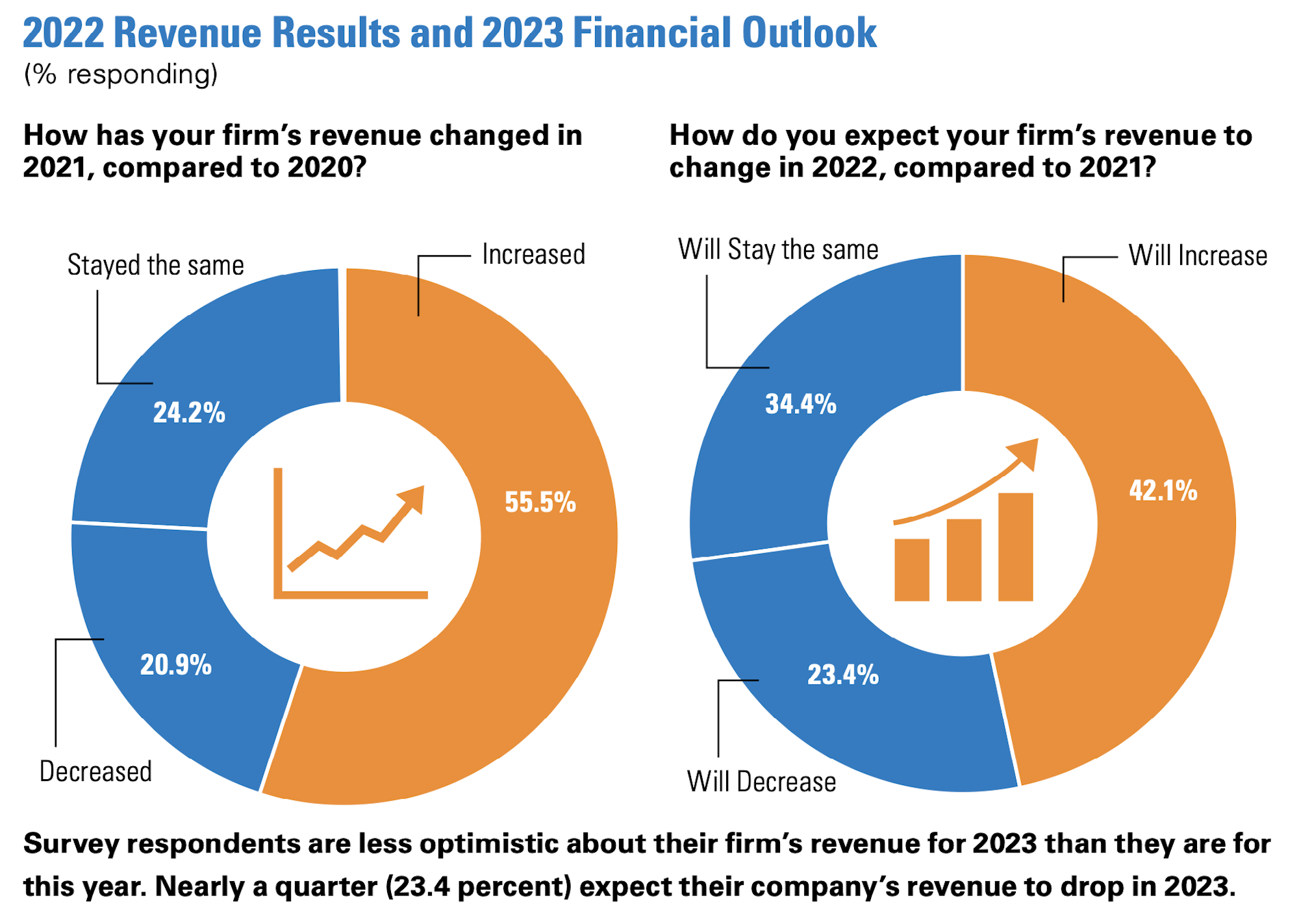
Euphoria, though, might be short-lived, and firms are tempering their prognoses about the future. Nearly one-quarter—23.4%—expect their revenue to be down in 2023, and another 34.4% predict a flat year. Competition ranked third, behind general economic conditions and inflation, as the most important concern AEC firms believe they will face next year. Nearly two-thirds—64%—anticipate that materials prices will continue to rise in 2023. An even higher number, 71.2%, said they were girding for increases in bid prices for projects.
Our poll also found at least one-fifth of firms are concerned about the availability of capital funding for projects, regulations, cashflow management, and keeping their staffs motivated.
When asked about what business development strategies they planned to deploy next year, more than half—53.4%—said they would hire selectively to burnish their firms’ competitiveness, and 47.1% were planning to step up their staff training and education to enhance competitiveness.
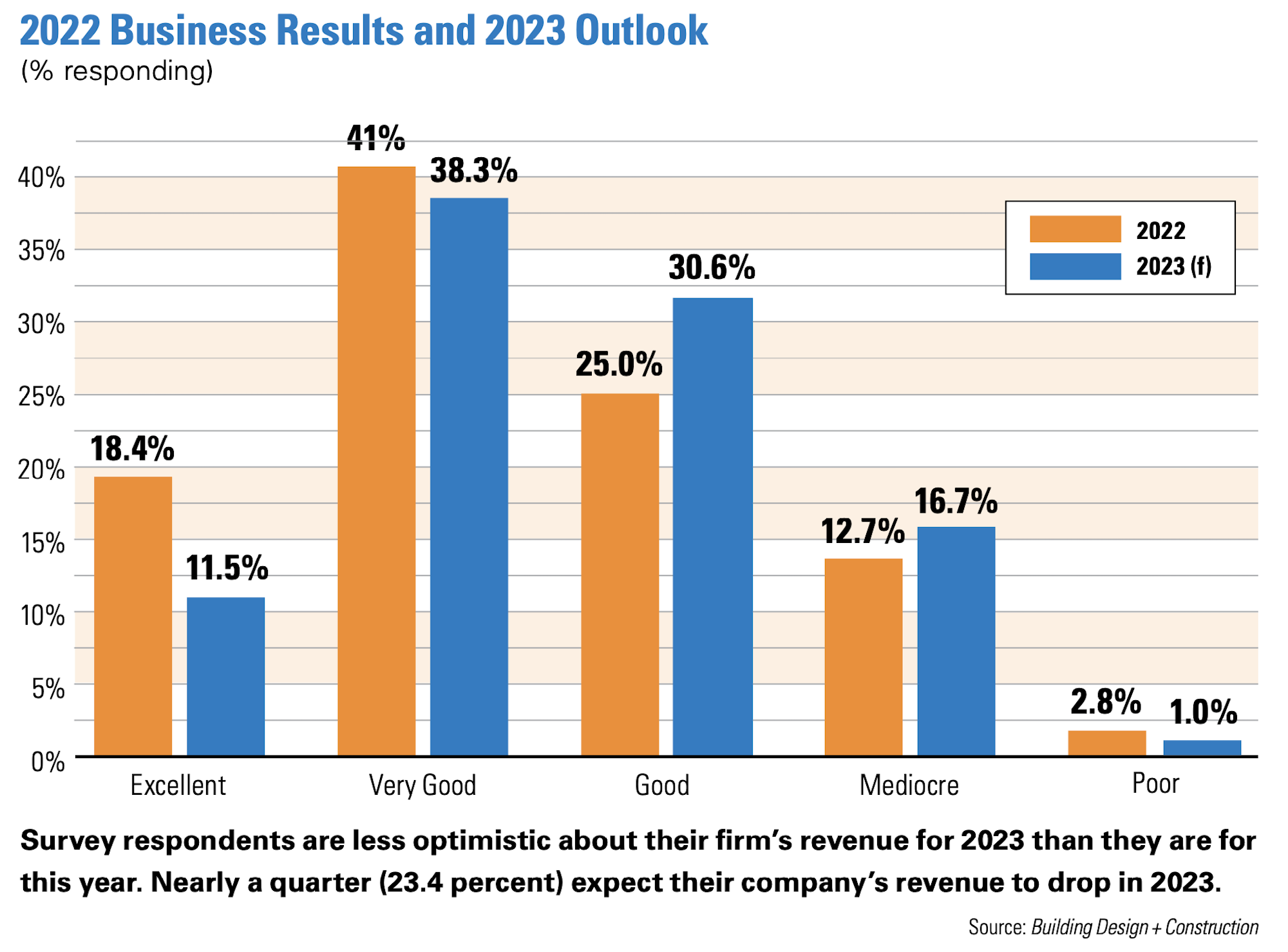
Other business strategies these firms are plotting include increasing their marketing and public relations (25.3% of firms polled currently don’t use social media, and among that do LinkedIn is their preferred platform), investing more in technology, and creating new service or business opportunity.
U.S. design and construction firms pick their battles, sector by sector
Our survey asked AEC firms to assess their prospects in 18 construction sectors. Sizable percentages (at least 30%) were hopeful about business for airports, data centers, government/military buildings, healthcare, industrial/warehouse, multifamily and senior living residential, science + technology, and university. At least 20% of respondents saw their prospects as “average” for performing arts centers, hospitality, K-12 education, and sports and recreations. AEC firms placed offices and interior fitouts, religious, and retail/commercial in the “weak” or “very weak” categories.
Here's a closer look at their responses. Keep in mind that these firms aren’t active in every sector, so the numbers providing ratings were smaller than the total in each category. It’s also worth noting that nearly one-third of the AEC firms polled generate between 25% and 74% of their annual business from reconstruction projects:
• Healthcare appears to hold out the greatest opportunities for next year. More than 45% of respondents rated their prospects in this sector as excellent or good. Multifamily received those ratings from 43.1% or AEC firms polled, industrial/warehouse from 39.7%, and data centers from 37.8%.
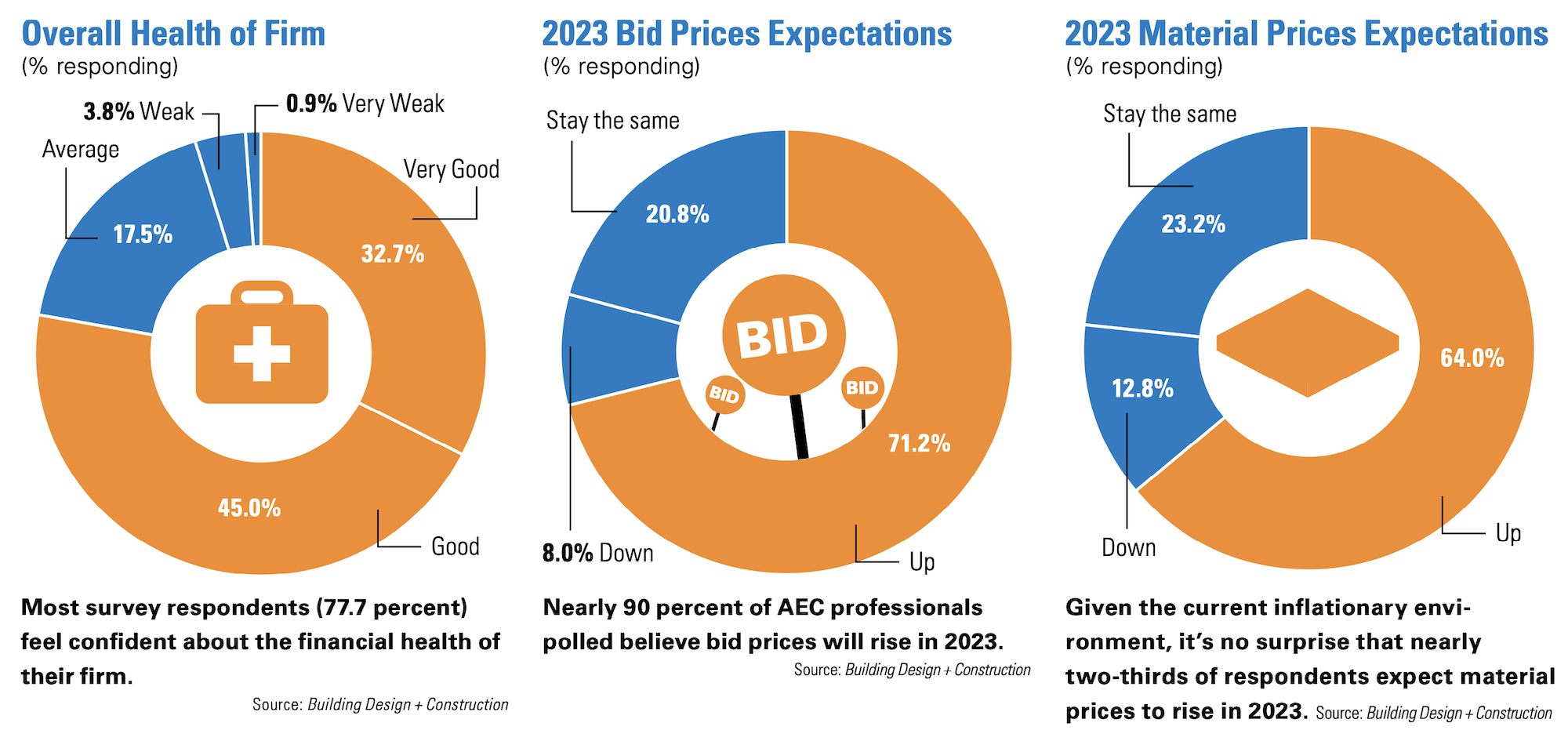
• Through September, construction spending in the office sector was up only 0.7%, according to Census Bureau estimates. The AEC firms that responded to our survey aren’t anticipating a rebound in this sector any time soon: 41.3% rated their prospects weak or very week. Another 23.5% gave the same ratings to office interiors and fitouts.
Even though Census estimates that the commercial sector (which encompasses retail) was up 22.4% through September, our survey’s respondents are still taking a wait-and-see approach, as 33.3% saw their prospects in retail next year as weak or very weak.
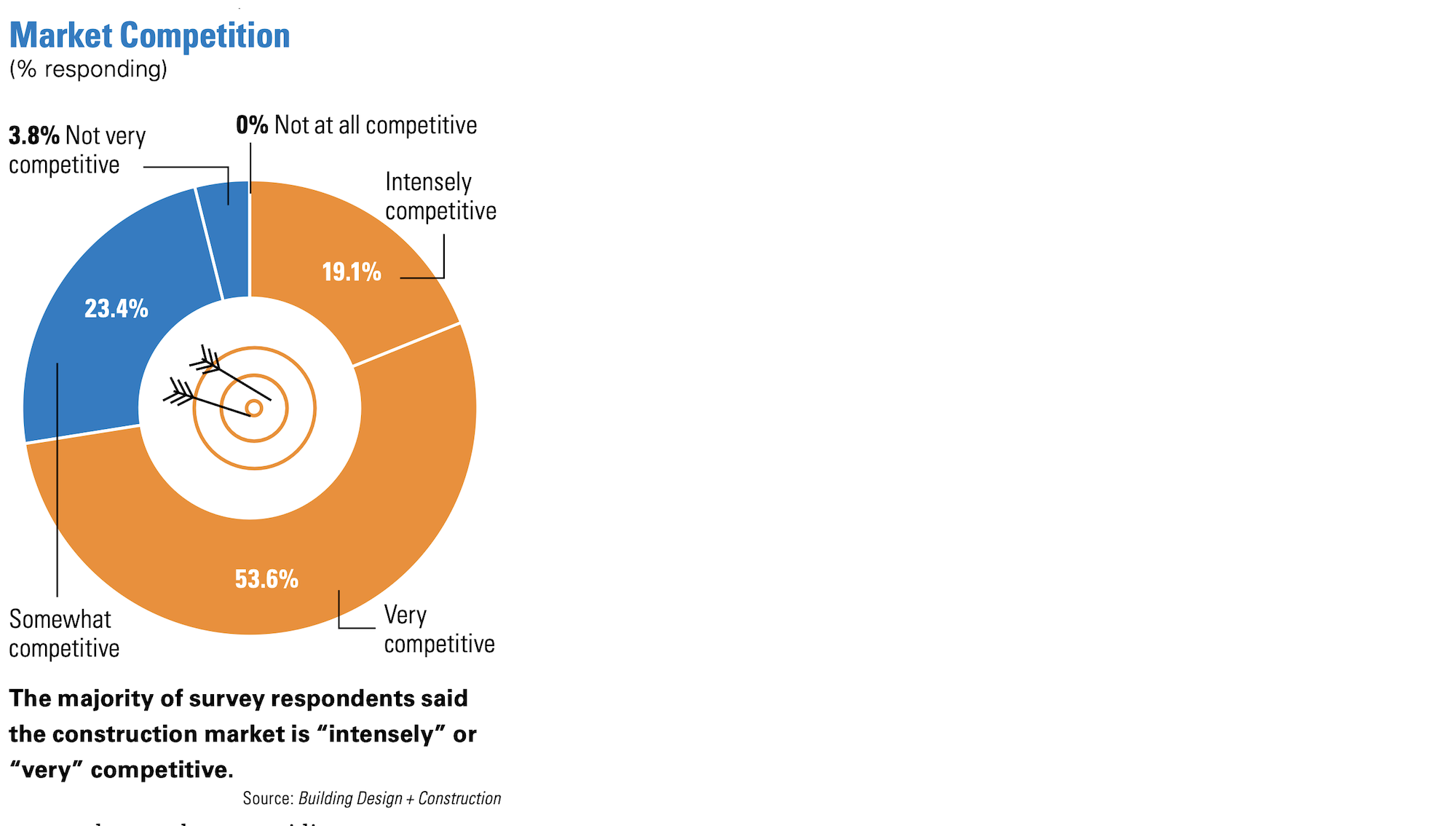
• 29% of respondents said their firms don’t build in the retail sector. And even with the uptick in firms that have expanded their practices and services, only around 10% of our survey’s respondents see mergers or acquisitions in their immediate futures. Our survey reveals an industry whose firms, in many cases, focus on a limited array of typologies and clients, and leave other sectors to specialists.
It was not surprising that 53.2% of respondent firms aren’t building airports and 41.2% aren’t active in the religious sector. Only about half of respondent firms—46.2%—engage performing arts center projects, and 44.3% keep their distances from data centers. But even some of the broader sectors, notably education, find between 30% and 33% of respondent firms absent. Nearly two-fifths aren’t active in science + technology construction, either, and more than two-fifths don’t build in the multifamily sector.
Related Stories
Market Data | Jul 24, 2023
Leading economists call for 2% increase in building construction spending in 2024
Following a 19.7% surge in spending for commercial, institutional, and industrial buildings in 2023, leading construction industry economists expect spending growth to come back to earth in 2024, according to the July 2023 AIA Consensus Construction Forecast Panel.
Codes and Standards | Jul 17, 2023
Outdated federal rainfall analysis impacting infrastructure projects, flood insurance
Severe rainstorms, sometimes described as “atmospheric rivers” or “torrential thunderstorms,” are making the concept of a “1-in-100-year flood event” obsolete, according to a report from First Street Foundation, an organization focused on weather risk research.
Multifamily Housing | Jul 13, 2023
Walkable neighborhoods encourage stronger sense of community
Adults who live in walkable neighborhoods are more likely to interact with their neighbors and have a stronger sense of community than people who live in car-dependent communities, according to a report by the Herbert Wertheim School of Public Health and Human Longevity Science at University of California San Diego.
Multifamily Housing | Jun 29, 2023
5 ways to rethink the future of multifamily development and design
The Gensler Research Institute’s investigation into the residential experience indicates a need for fresh perspectives on residential design and development, challenging norms, and raising the bar.
Apartments | Jun 27, 2023
Average U.S. apartment rent reached all-time high in May, at $1,716
Multifamily rents continued to increase through the first half of 2023, despite challenges for the sector and continuing economic uncertainty. But job growth has remained robust and new households keep forming, creating apartment demand and ongoing rent growth. The average U.S. apartment rent reached an all-time high of $1,716 in May.
Contractors | Jun 26, 2023
Most top U.S. contractors rarely deliver projects on time: new study
About 63% of leading U.S. contractors are delivering projects out of schedule, according to a survey of over 300 C-suite executives and owners in the construction industry by XYZ Reality. The study implies that the industry is struggling with significant backlogs due, in part, to avoidable defects, scan, and rework.
Industry Research | Jun 15, 2023
Exurbs and emerging suburbs having fastest population growth, says Cushman & Wakefield
Recently released county and metro-level population growth data by the U.S. Census Bureau shows that the fastest growing areas are found in exurbs and emerging suburbs.
Contractors | Jun 13, 2023
The average U.S. contractor has 8.9 months worth of construction work in the pipeline, as of May 2023
Associated Builders and Contractors reported that its Construction Backlog Indicator remained unchanged at 8.9 months in May, according to an ABC member survey conducted May 20 to June 7. The reading is 0.1 months lower than in May 2022. Backlog in the infrastructure category ticked up again and has now returned to May 2022 levels. On a regional basis, backlog increased in every region but the Northeast.
Industry Research | Jun 13, 2023
Two new surveys track how the construction industry, in the U.S. and globally, is navigating market disruption and volatility
The surveys, conducted by XYZ Reality and KPMG International, found greater willingness to embrace technology, workplace diversity, and ESG precepts.
| Jun 5, 2023
Communication is the key to AEC firms’ mental health programs and training
The core of recent awareness efforts—and their greatest challenge—is getting workers to come forward and share stories.








